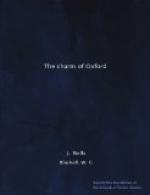In the great period of the seventeenth century, Merton had the distinction of being one of the few colleges which were Parliamentarian in sympathy. Hence the Warden was deposed by King Charles, who installed in his place a really great man, William Harvey, the discoverer of the circulation of the blood. But the king did more harm than good to the college; it was turned into lodgings for Queen Henrietta Maria and her court, and ladies were intruded and children born within college walls. These proceedings were respectable, though unusual; but the college was even more humiliated by the visit of Charles II, who installed there, among other court ladies, the notorious Duchess of Cleveland. The college, however, with the Revolution, returned to less courtly views, and its Whig connection found an honourable representative in Richard Steele, the founder of the Tatler. It is not surprising that so cheerful a gentleman left Oxford without a degree, but “with the love of the whole society.” The college register specially notes his gift of his Tatler; he was acting on the sound rule, by no means so universally followed as it ought to be, that Oxford authors should present their books to their college library.
Merton, as has been said, is the “type” college, if one may thus apply a scientific term; hence it is fitting that to it belong the two men to whom perhaps Oxford owes most. Thomas Bodley was a fellow and lecturer in Greek there, before he left Oxford for diplomacy, and accumulated that wealth which he used to endow the oldest and the most fascinating, if not the largest, of British libraries. And among the men who have gained from “the rare books in the public library” a way to a “perfect elysium,” none better deserves remembrance than the Mertonian, Antony Wood, whose monument stands in Merton Chapel, but who has raised monumentum aere perennius to himself, in his History of the University of Oxford and his Athenae Oxonienses.
[Plate VII. Merton College : The Library Interior]
MERTON LIBRARY
“Hail, tree of knowledge!
thy leaves fruit; which well
Dost in the midst of Paradise arise,
Oxford, the Muses’ paradise,
From which may never sword the blest expel.
Hail, bank of all past ages! where they lie
To enrich, with interest, posterity.”
COWLEY.
“The appearance of the library” (at Merton), says the great Cambridge scholar, J. Willis Clark, in his Care of Books, “is so venerable, so unlike any similar room with which I am acquainted, that it must always command admiration.”
He classes it with the libraries at Oxford of Corpus, St. John’s, Jesus, and Magdalen, and he regretfully adds that no college library in his own University has retained the same old features as these have done. But none of the four can compare with Merton, either in antiquarian interest or in picturesqueness; it stands in a class by itself.




